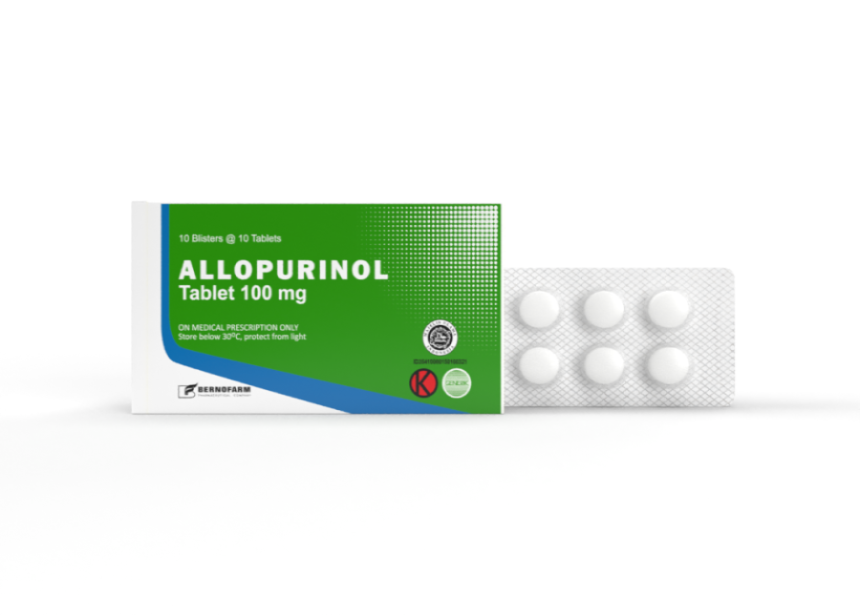
Table of contents
- What is Allopurinol
- Allopurinol Indications
- Allopurinol Side Effects
- How to Use Allopurinol
- How to Buy Allopurinol in the USA
- Consulting a Healthcare Provider
- Obtaining a Prescription
- Choosing a Pharmacy
- Using Insurance
- Purchasing Online
- Monitoring and Refills
- Prices of Allopurinol in the USA
- Retail Pharmacy Prices
- Online Pharmacy Prices
- Insurance and Discount Programs
- Factors Influencing Prices
- Allopurinol Dosages and Differences
- Gout and Its Treatment Methods with Allopurinol
- Understanding Gout
- Allopurinol: An Effective Treatment for Gout
- Benefits of Allopurinol in Gout Management
- Considerations and Side Effects
- Comprehensive Gout Management
- New Opportunities for Allopurinol in the Treatment of Gout
What is Allopurinol
Allopurinol is a medication primarily used to treat gout and certain types of kidney stones by reducing the production of uric acid in the body. It belongs to a class of drugs known as xanthine oxidase inhibitors, which work by inhibiting the enzyme xanthine oxidase, responsible for converting hypoxanthine to xanthine and then to uric acid. By decreasing uric acid levels, allopurinol helps prevent the formation of urate crystals, which can cause pain and inflammation in joints and tissues.
Aside from treating gout and kidney stones, allopurinol is also used to manage uric acid levels in patients undergoing cancer treatment. Certain chemotherapy medications can cause a rapid increase in uric acid levels, leading to a condition called tumor lysis syndrome. Allopurinol helps prevent this by keeping uric acid levels in check, thereby reducing the risk of complications associated with high uric acid concentrations in the blood.
The typical dosage of allopurinol varies depending on the condition being treated and the patient's response to the medication. For gout, the starting dose is usually 100 mg per day, which can be gradually increased based on uric acid levels and clinical response. It is essential for patients to follow their healthcare provider's instructions carefully and to have their blood uric acid levels monitored regularly to ensure the medication is working effectively and to adjust the dose as needed.
While allopurinol is generally well-tolerated, it can cause side effects in some individuals. Common side effects include rash, gastrointestinal upset, and drowsiness. In rare cases, allopurinol can cause more severe reactions, such as hypersensitivity syndrome, characterized by fever, rash, and liver and kidney dysfunction. Patients are advised to report any unusual symptoms to their healthcare provider promptly. As with any medication, the benefits and risks of allopurinol should be discussed with a healthcare provider to determine if it is the appropriate treatment for a given condition.
Allopurinol Indications
Allopurinol is primarily indicated for the treatment and prevention of gout, a type of arthritis characterized by sudden, severe attacks of pain, redness, and tenderness in joints. Gout occurs due to elevated levels of uric acid in the blood, leading to the formation of urate crystals in the joints. By reducing uric acid production, allopurinol helps prevent these painful flare-ups and is used as a long-term management strategy to lower uric acid levels in individuals with chronic gout.
Another key indication for allopurinol is the prevention and treatment of kidney stones, specifically those composed of uric acid. High levels of uric acid can lead to the formation of these types of stones, which can cause significant pain and urinary tract complications. Allopurinol helps reduce uric acid levels in the urine, thereby decreasing the likelihood of stone formation and promoting the dissolution of existing stones, providing relief and preventing recurrence.
Allopurinol is also indicated for managing hyperuricemia associated with certain types of cancer therapy. Cancer treatments such as chemotherapy can cause rapid cell turnover, leading to the release of large amounts of uric acid into the bloodstream, a condition known as tumor lysis syndrome. Allopurinol helps manage this by inhibiting the production of uric acid, thereby reducing the risk of acute uric acid nephropathy and other complications related to high uric acid levels during cancer treatment.
Additionally, allopurinol is used in the management of certain genetic disorders associated with overproduction of uric acid, such as Lesch-Nyhan syndrome and some types of enzymatic deficiencies. These conditions can lead to severe hyperuricemia, causing gout-like symptoms and other complications. Allopurinol helps control uric acid levels in these patients, alleviating symptoms and improving quality of life. It is essential for individuals with these conditions to receive proper medical supervision to ensure effective and safe use of allopurinol.
Allopurinol Side Effects
Allopurinol, while effective in managing conditions like gout and kidney stones, can cause side effects in some individuals. These side effects range from common and mild to rare and severe. It is important to be aware of these potential reactions and to consult a healthcare provider if any adverse effects occur.
Common Side Effects
- Rash
- Nausea
- Diarrhea
- Drowsiness
- Headache
- Changes in taste
These common side effects are usually mild and often diminish as the body adjusts to the medication. If any of these symptoms persist or become bothersome, it is advisable to seek medical advice.
Less Common Side Effects
- Vomiting
- Joint pain
- Edema (swelling)
- Alopecia (hair loss)
- Dizziness
These less common side effects may require medical attention if they persist or worsen. Patients should discuss any concerning symptoms with their healthcare provider.
Serious Side Effects
- Severe rash or skin reactions (e.g., Stevens-Johnson syndrome, toxic epidermal necrolysis)
- Hepatitis or liver dysfunction
- Kidney problems
- Bone marrow suppression
- Hypersensitivity syndrome, which may include fever, rash, and organ involvement
Serious side effects are rare but require immediate medical attention. Symptoms like severe skin reactions, yellowing of the skin or eyes, dark urine, unusual fatigue, or signs of infection (e.g., fever, sore throat) should be reported to a healthcare provider immediately.
Allergic Reactions
- Itching or hives
- Swelling of the face, lips, or throat
- Difficulty breathing
Allergic reactions to allopurinol can be serious and require urgent medical care. If any signs of an allergic reaction occur, such as severe itching, hives, swelling, or difficulty breathing, it is crucial to seek emergency medical help.
Monitoring and regular check-ups with a healthcare provider can help manage any side effects experienced while taking allopurinol. It is important to follow prescribed dosages and to report any adverse reactions promptly to ensure safe and effective treatment.
How to Use Allopurinol
Allopurinol is a medication used to lower uric acid levels in the blood, commonly prescribed for conditions such as gout and kidney stones. Proper use of allopurinol is essential to ensure its effectiveness and minimize the risk of side effects. Here are the key guidelines on how to use allopurinol correctly.
Dosage and Administration
Allopurinol is typically taken orally, once or twice a day, as directed by your healthcare provider. The dosage varies depending on the condition being treated, the severity of the condition, and the patient's response to the medication. It is important to follow your doctor's instructions closely. The starting dose for adults usually ranges from 100 mg to 300 mg per day, and it can be adjusted based on the uric acid levels and clinical response. For more severe conditions, the dose can go up to 800 mg per day.
Timing and Consistency
To maximize the benefits of allopurinol, it is important to take it at the same time each day. This helps maintain an even level of the medication in your blood. Taking allopurinol with food or milk can help reduce the risk of stomach upset, a common side effect. Consistency in taking the medication as prescribed is crucial for effective management of your condition.
Hydration
Staying well-hydrated is important while taking allopurinol. Drinking plenty of fluids, typically around 8-10 glasses of water a day, helps prevent the formation of kidney stones and aids in the elimination of uric acid from the body. Proper hydration supports kidney function and enhances the effectiveness of allopurinol in lowering uric acid levels.
Regular Monitoring
Regular monitoring of uric acid levels and kidney function is essential while using allopurinol. Your healthcare provider will schedule periodic blood tests to check your uric acid levels and ensure the medication is working effectively. These tests also help monitor for potential side effects and allow your doctor to adjust the dosage if necessary. It is important to attend all scheduled appointments and communicate any side effects or concerns to your healthcare provider promptly.
Avoiding Triggers
While taking allopurinol, it is beneficial to avoid factors that can trigger gout attacks or increase uric acid levels. This includes limiting the intake of high-purine foods (such as red meat, organ meats, and certain seafood), alcohol, and sugary beverages. Maintaining a healthy diet, regular exercise, and a healthy weight can also help manage your condition more effectively alongside allopurinol treatment.
By following these guidelines, patients can use allopurinol effectively to manage their uric acid levels and prevent the complications associated with high uric acid. Proper use of the medication, combined with lifestyle adjustments and regular medical monitoring, ensures optimal treatment outcomes.
How to Buy Allopurinol in the USA
Purchasing allopurinol in the USA involves several steps to ensure you obtain the medication safely and legally. Allopurinol is a prescription medication, so a valid prescription from a licensed healthcare provider is required.
Consulting a Healthcare Provider
The first step in buying allopurinol is to consult with a healthcare provider. They will evaluate your condition, determine if allopurinol is appropriate for you, and provide a prescription. You can schedule an appointment with your primary care physician, a specialist, or use telehealth services for a virtual consultation.
Obtaining a Prescription
Once your healthcare provider determines that allopurinol is suitable for your condition, they will write you a prescription. Ensure that you discuss the proper dosage, potential side effects, and any other concerns you may have with your provider. The prescription can be provided in a paper format or sent electronically to a pharmacy of your choice.
Choosing a Pharmacy
Allopurinol can be purchased at most retail pharmacies, including chain stores like CVS, Walgreens, and Rite Aid, as well as independent pharmacies. You can also use online pharmacies, which may offer the convenience of home delivery. When choosing a pharmacy, consider factors such as location, price, and whether they accept your insurance.
Using Insurance
If you have health insurance, check if it covers allopurinol. Most insurance plans cover prescription medications, and using insurance can significantly reduce the out-of-pocket cost. Provide your insurance information to the pharmacy when filling your prescription. If you are uninsured or the medication is not covered, ask the pharmacy about discount programs or use services like GoodRx to find the best prices.
Purchasing Online
Online pharmacies can be a convenient option for purchasing allopurinol. Ensure that the online pharmacy is legitimate and requires a valid prescription. Websites like HealthWarehouse, Blink Health, and Honeybee Health are reputable online pharmacies in the USA. After placing an order and submitting your prescription, the medication will be shipped directly to your address.
Monitoring and Refills
After purchasing allopurinol, monitor your condition and report any side effects to your healthcare provider. Follow their instructions for follow-up appointments and lab tests. When you are nearing the end of your supply, contact your pharmacy or use their online services to request a refill. Ensure you have a sufficient supply to avoid interruptions in your treatment.
Prices of Allopurinol in the USA
The cost of allopurinol in the USA can vary significantly based on factors such as the pharmacy, dosage, quantity, and whether you use insurance or discount programs. Understanding these factors can help you find the best prices for this essential medication.
Retail Pharmacy Prices
At retail pharmacies like CVS, Walgreens, and Rite Aid, the price of allopurinol can range from $10 to $40 for a 30-day supply, depending on the dosage. Generic versions of allopurinol are typically less expensive than brand-name versions. For example, a 30-day supply of 100 mg tablets may cost around $10 to $20, while the 300 mg tablets might range from $20 to $40. Prices can also vary based on the pharmacy's location and pricing policies.
Online Pharmacy Prices
Online pharmacies often offer competitive prices and the convenience of home delivery. Websites like HealthWarehouse, Blink Health, and Honeybee Health provide pricing information and allow you to compare costs easily. On these platforms, a 30-day supply of 100 mg allopurinol can cost as low as $8 to $15, while the 300 mg tablets might range from $15 to $30. It is important to ensure that the online pharmacy is legitimate and requires a valid prescription.
Insurance and Discount Programs
Health insurance can significantly reduce the out-of-pocket cost of allopurinol. Most insurance plans cover prescription medications, and you may only need to pay a copay, which could range from $5 to $15 for a 30-day supply. Additionally, discount programs such as GoodRx, SingleCare, and pharmacy-specific savings programs can help lower the cost. By using these programs, patients can often find prices comparable to or even lower than insurance copays.
Factors Influencing Prices
Several factors influence the price of allopurinol, including the dosage strength, quantity purchased, and pharmacy pricing policies. Bulk purchases, such as a 90-day supply, can offer cost savings compared to monthly refills. Additionally, prices may vary between urban and rural areas
Allopurinol Dosages and Differences
Allopurinol is available in various dosages, each designed to meet different therapeutic needs. The most common dosages are 100 mg and 300 mg tablets. The appropriate dosage for a patient depends on the severity of their condition, their response to the medication, and any underlying health issues.
100 mg Tablets
The 100 mg dosage of allopurinol is often prescribed for patients who are beginning treatment or who require a lower dose to manage their uric acid levels. This dosage is particularly useful for patients with mild to moderate gout or those who have a higher risk of side effects. The lower dose allows for gradual titration, minimizing the risk of adverse reactions and allowing the body to adjust to the medication.
300 mg Tablets
The 300 mg dosage is typically prescribed for patients with more severe gout or those who have not achieved adequate uric acid control with the lower dose. This higher dose is more effective at significantly reducing uric acid levels, helping to prevent the formation of urate crystals and reduce the frequency and severity of gout attacks. However, the 300 mg tablets may have a higher risk of side effects, so close monitoring by a healthcare provider is essential.
Other Available Dosages
In addition to the standard 100 mg and 300 mg tablets, allopurinol is available in other dosages, such as 200 mg tablets in some markets. These intermediate dosages can be useful for patients who need a dose adjustment that is not achievable with the 100 mg and 300 mg tablets alone. For instance, combining different tablet strengths can help tailor the dosage to the patient's specific needs, ensuring optimal control of uric acid levels.
Choosing the Right Dosage
The choice of allopurinol dosage depends on various factors, including the patient's uric acid levels, kidney function, and overall health. Healthcare providers typically start with a lower dose and gradually increase it based on the patient's response and tolerance. Regular monitoring of uric acid levels and kidney function is crucial to adjust the dosage appropriately and to minimize the risk of side effects. Patients should follow their healthcare provider's instructions carefully and report any side effects or concerns promptly.
By understanding the differences between the available dosages of allopurinol, patients and healthcare providers can work together to determine the most effective and safe treatment plan for managing conditions like gout and hyperuricemia.
Gout and Its Treatment Methods with Allopurinol
Gout is a form of arthritis characterized by sudden, severe attacks of pain, redness, and tenderness in the joints. It is caused by elevated levels of uric acid in the blood, which can form crystals in the joints, leading to inflammation and intense pain. One of the most effective medications for managing gout is allopurinol. This article explores gout and the methods of its treatment with allopurinol.
Understanding Gout
Gout occurs when there is an excess of uric acid in the body, a condition known as hyperuricemia. Uric acid is a waste product formed from the breakdown of purines, substances found in certain foods and beverages. When uric acid levels become too high, it can crystallize and deposit in the joints, causing inflammation and pain.
- Symptoms: Sudden and severe joint pain, swelling, redness, and warmth, often affecting the big toe but can also impact other joints.
- Risk Factors: Diet high in purines, obesity, medical conditions such as hypertension and diabetes, family history of gout, and certain medications.
Allopurinol: An Effective Treatment for Gout
Allopurinol is a medication commonly prescribed to lower uric acid levels in the blood and prevent gout attacks. It works by inhibiting xanthine oxidase, an enzyme involved in the production of uric acid.
- Mechanism of Action: Allopurinol reduces the production of uric acid by blocking the enzyme xanthine oxidase, thereby lowering uric acid levels in the blood.
- Dosage: The typical starting dose is 100 mg per day, which can be gradually increased based on the patient's uric acid levels and response to the medication.
- Administration: Allopurinol is taken orally, usually once daily, with or without food. Consistent use is necessary to maintain low uric acid levels and prevent gout flares.
Benefits of Allopurinol in Gout Management
Allopurinol offers several benefits for individuals with gout, making it a cornerstone of long-term gout management.
- Prevention of Gout Attacks: By lowering uric acid levels, allopurinol helps prevent the formation of urate crystals and reduces the frequency and severity of gout attacks.
- Protection of Joints: Continuous use of allopurinol prevents joint damage and reduces the risk of developing chronic tophaceous gout, where urate crystals form lumps under the skin.
- Management of Hyperuricemia: Allopurinol effectively manages hyperuricemia, which is essential not only for preventing gout but also for reducing the risk of kidney stones and other complications associated with high uric acid levels.
Considerations and Side Effects
While allopurinol is effective, it is important to consider potential side effects and use the medication under medical supervision.
- Common Side Effects: Rash, gastrointestinal upset, and mild liver function abnormalities. These side effects are usually mild and temporary.
- Serious Side Effects: In rare cases, allopurinol can cause severe allergic reactions, including Stevens-Johnson syndrome. Patients should report any unusual symptoms to their healthcare provider immediately.
- Drug Interactions: Allopurinol can interact with other medications, including certain antibiotics and blood thinners. Patients should inform their doctor about all medications they are taking.
Comprehensive Gout Management
In addition to taking allopurinol, comprehensive management of gout includes lifestyle modifications and dietary changes.
- Dietary Changes: Limiting intake of high-purine foods such as red meat, shellfish, and alcohol. Increasing consumption of low-purine foods like fruits, vegetables, and whole grains.
- Hydration: Drinking plenty of water to help flush uric acid from the body and reduce the risk of kidney stones.
- Weight Management: Maintaining a healthy weight to reduce the burden on joints and lower uric acid levels.
- Regular Monitoring: Regular blood tests to monitor uric acid levels and kidney function, ensuring the effectiveness and safety of allopurinol treatment.
New Opportunities for Allopurinol in the Treatment of Gout
Allopurinol has long been a cornerstone in the treatment of gout, effectively lowering uric acid levels and preventing gout flares. Recent research and advancements have opened up new opportunities for allopurinol in managing gout more effectively and safely. This article explores these emerging possibilities and their potential impact on gout treatment.
Personalized Dosing Strategies
One of the new approaches in allopurinol treatment is the use of personalized dosing strategies based on genetic and biochemical markers.
- Genetic Testing: Genetic variations, such as HLA-B*58:01, can influence a patient's risk of severe allergic reactions to allopurinol. Genetic testing can help identify patients who may need alternative treatments or closer monitoring.
- Uric Acid Levels: Regular monitoring of uric acid levels can help tailor the dosage of allopurinol to achieve optimal control while minimizing side effects.
- Kidney Function: Adjusting the dose based on kidney function tests ensures that patients with renal impairment receive a safe and effective amount of allopurinol.
Combination Therapies
Combining allopurinol with other medications can enhance its effectiveness and provide better control of gout symptoms.
- Febuxostat: For patients who do not respond adequately to allopurinol alone, combining it with febuxostat, another xanthine oxidase inhibitor, can provide better uric acid control.
- Lesinurad: This medication, which increases uric acid excretion, can be used alongside allopurinol to achieve lower uric acid levels in refractory cases.
- Anti-Inflammatory Agents: Using anti-inflammatory medications such as colchicine or NSAIDs in combination with allopurinol can help manage acute gout flares while maintaining long-term uric acid control.
Extended Benefits Beyond Gout
Emerging research suggests that allopurinol may have benefits beyond gout management, potentially offering protective effects against other health conditions.
- Cardiovascular Protection: Studies indicate that lowering uric acid levels with allopurinol may reduce the risk of cardiovascular events, such as heart attacks and strokes, in patients with hyperuricemia.
- Kidney Disease: Allopurinol may help slow the progression of chronic kidney disease by reducing uric acid levels and preventing urate crystal deposition in the kidneys.
- Metabolic Syndrome: By managing hyperuricemia, allopurinol could contribute to better control of metabolic syndrome components, such as hypertension and insulin resistance.
Improved Formulations and Delivery Methods
Advancements in pharmaceutical technology have led to the development of new formulations and delivery methods for allopurinol, enhancing its effectiveness and patient adherence.
- Sustained-Release Formulations: Sustained-release versions of allopurinol provide more consistent uric acid control with fewer peaks and troughs, potentially improving efficacy and reducing side effects.
- Injectable Forms: Injectable allopurinol formulations are being explored for patients who have difficulty with oral medications or require rapid reduction of uric acid levels.
- Combination Pills: Combining allopurinol with other gout medications in a single pill could simplify treatment regimens and improve patient compliance.
Targeted Patient Education and Support
Educating patients about the importance of adherence to allopurinol therapy and providing support can significantly improve treatment outcomes.
- Patient Education Programs: Comprehensive education about gout management, including the role of allopurinol, diet, and lifestyle changes, helps patients understand their treatment and adhere to it more effectively.
- Regular Follow-Up: Scheduled follow-ups with healthcare providers ensure that patients are monitored for efficacy and side effects, allowing for timely adjustments to their treatment plan.
- Support Groups: Joining support groups for individuals with gout can provide encouragement and shared experiences, helping patients stay motivated and informed about their condition and treatment.
In summary, new opportunities for allopurinol in the treatment of gout include personalized dosing strategies, combination therapies, potential benefits beyond gout, improved formulations and delivery methods, and enhanced patient education and support. These advancements hold the promise of more effective and comprehensive management of gout, improving the quality of life for those affected by this painful condition.
FAQ
What is Allopurinol?
Allopurinol is a medication used to reduce uric acid levels in the blood. It is commonly prescribed for conditions like gout and kidney stones caused by high uric acid levels.
How does Allopurinol work?
Allopurinol works by inhibiting an enzyme called xanthine oxidase, which is involved in the production of uric acid. This helps lower the levels of uric acid in the blood and prevents the formation of crystals that can cause pain and inflammation.
What conditions does Allopurinol treat?
Allopurinol is used to treat gout, kidney stones, and certain types of kidney problems caused by high uric acid levels. It may also be used to prevent increased uric acid levels in patients undergoing cancer chemotherapy.
How should I take Allopurinol?
Allopurinol should be taken exactly as prescribed by your doctor, usually once or twice daily. It is important to take it with plenty of water to help prevent kidney stones.
What are the common side effects of Allopurinol?
Common side effects include upset stomach, diarrhea, drowsiness, and a rash. These side effects are generally mild and temporary. If you experience severe side effects, contact your doctor immediately.
Can Allopurinol be taken with other medications?
Allopurinol can interact with several other medications, including certain antibiotics, blood thinners, and cancer medications. Always inform your doctor about all medications and supplements you are taking.
Is Allopurinol safe during pregnancy?
Allopurinol should be used during pregnancy only if clearly needed. Discuss the potential risks and benefits with your doctor before starting treatment.
Can I drink alcohol while taking Allopurinol?
It is advisable to limit alcohol consumption while taking Allopurinol, as alcohol can increase uric acid levels and worsen gout symptoms.
How long does it take for Allopurinol to work?
It may take several weeks to months to see the full effects of Allopurinol. It is important to continue taking the medication as prescribed, even if you do not notice immediate improvement.
What should I do if I miss a dose of Allopurinol?
If you miss a dose, take it as soon as you remember. If it is almost time for your next dose, skip the missed dose and resume your regular schedule. Do not take a double dose to make up for the missed one.
How much does Allopurinol cost?
The price of Allopurinol can vary depending on the pharmacy and your insurance coverage. On average, the cost for a 30-day supply of generic Allopurinol ranges from $10 to $30 without insurance.
Is there a generic version of Allopurinol?
Yes, Allopurinol is available in generic form, which is usually less expensive than the brand-name version and is equally effective.
Does insurance cover Allopurinol?
Many insurance plans cover Allopurinol. Coverage and copay amounts will vary depending on your specific insurance plan.
Can I get discounts on Allopurinol?
Yes, discounts and coupons for Allopurinol are often available through various programs and websites, such as GoodRx and RxSaver.
Why is Allopurinol less expensive than other gout medications?
Allopurinol is often less expensive because it is available in generic form, which reduces the cost compared to brand-name medications.
Do I need a prescription to buy Allopurinol in the USA?
Yes, Allopurinol is a prescription medication, and you need a valid prescription from a licensed healthcare provider to purchase it in the USA.
Can I buy Allopurinol online in the USA?
Yes, you can buy Allopurinol online from reputable pharmacies. Ensure the online pharmacy is licensed and requires a prescription.
Is it legal to buy Allopurinol online?
It is legal to buy Allopurinol online from licensed pharmacies in the USA with a valid prescription. Be cautious of websites that sell it without requiring a prescription.
What should I look for in an online pharmacy?
Look for online pharmacies that are licensed, require a prescription, have a physical address in the USA, and offer customer service support.
Are there risks in buying Allopurinol online?
There are risks, such as receiving counterfeit or unsafe medications. Always verify the credibility of the online pharmacy before making a purchase.
What dosages of Allopurinol are available?
Allopurinol is available in tablet form in dosages of 100 mg and 300 mg.
How should I decide on the correct dosage?
The correct dosage should be determined by your healthcare provider based on your specific condition, severity of symptoms, and response to treatment.
Can I adjust my dosage of Allopurinol?
Do not adjust your dosage without consulting your healthcare provider. Incorrect dosages can increase the risk of side effects and reduce effectiveness.
What should I do if the dosage is too strong or too weak?
If you feel the dosage is not suitable, discuss with your healthcare provider. They may adjust the dose or recommend a different treatment plan.
Are there different forms of Allopurinol?
Allopurinol is primarily available in tablet form. Always follow your healthcare provider’s instructions on how to take it.
What conditions does Allopurinol treat?
Allopurinol is primarily used to treat gout, a form of arthritis caused by the buildup of uric acid crystals in the joints. It helps reduce the frequency of gout attacks and may also prevent the formation of tophi (uric acid deposits under the skin).
How does Allopurinol help with gout?
Allopurinol works by reducing the production of uric acid in the body. By inhibiting the enzyme xanthine oxidase, which is involved in uric acid production, Allopurinol lowers blood levels of uric acid, thereby reducing the likelihood of gout attacks.
Does Allopurinol treat other conditions?
Yes, besides gout, Allopurinol is also used to prevent certain types of kidney stones that are caused by excessive uric acid production.
How effective is Allopurinol in treating gout?
Allopurinol is highly effective in managing gout symptoms when taken as prescribed. It helps to lower uric acid levels in the blood, which is crucial for preventing the recurrence of gout attacks.
Are there alternative treatments to Allopurinol for gout?
Yes, there are alternative medications such as febuxostat and probenecid that can also be used to manage uric acid levels in patients with gout. Your healthcare provider will determine the most suitable treatment based on your individual health needs.







Leave a Reply
Your email address will not be published. Required fields are marked *